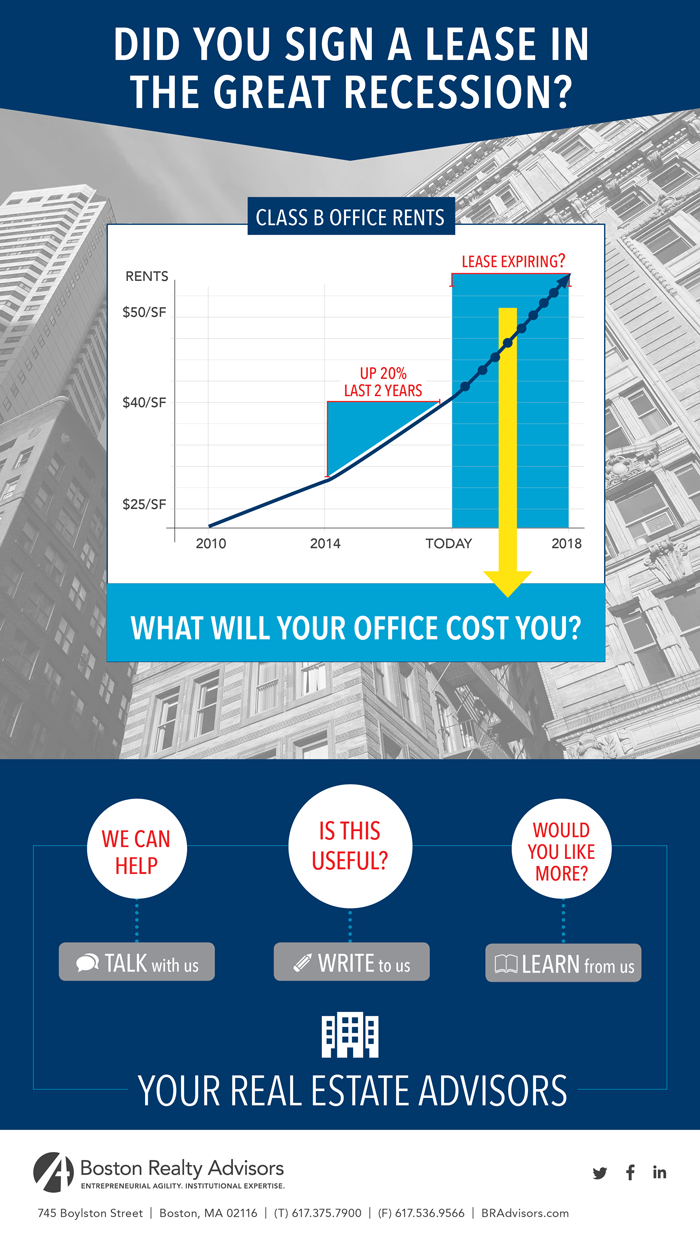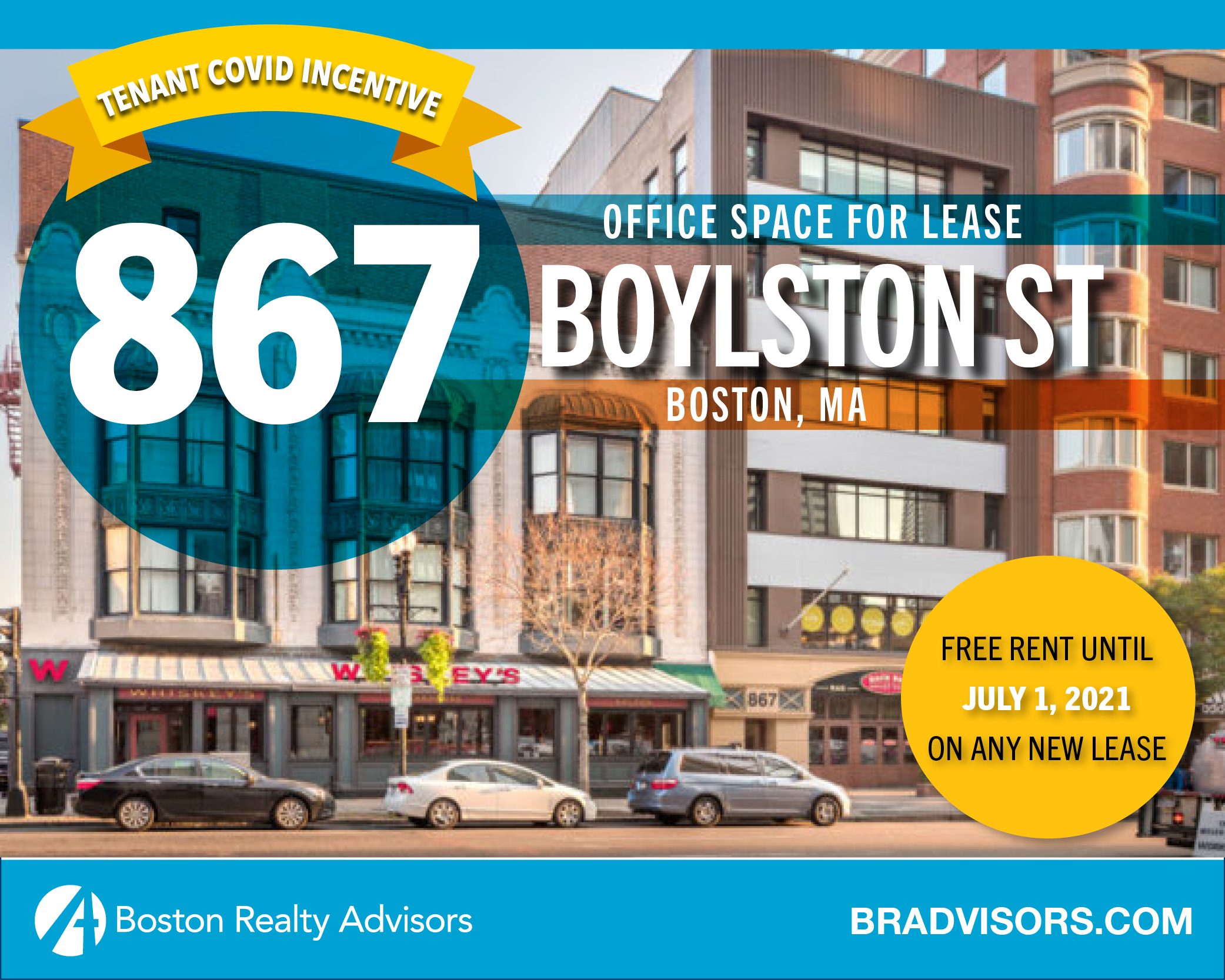
Back Bay COVID Lease Incentive – Free Rent Until July 2021
Learn more HERE.
In Cameron Sperance’s latest, he says that, “TAMI tenants accounted for 40% of all office transactions in Boston’s central business district last year.” Fresh off of over 140 leases in 2019, Managing Partner of Boston Realty Advisors, Wil Catlin said, “Office space in Boston has become a commodity, and commercial landlords are stepping up to ensure their asset is ready for today’s workforce. It’s a competitive environment and the landlords with quality, ready-to-go space are getting deals done.”
By Cameron Sperance | Bisnow | March 5, 2020
A string of recent layoffs in Boston was bad news for the city’s typically robust tech sector. But analysts say the furloughs have more to do with normal business operations than signs of a tech pullback from Beantown.

Cambridge-based Akamai Technologies cut around 75 jobs in early February. Wayfair laid off 550 employees worldwide, including 350 employees at its Boston headquarters, Feb. 13. The following week, Boston-based software company LogMeIn cut 300 jobs, nearly 70 of which were in Boston. Agricultural tech startup Indigo Ag then announced at the end of last month it was laying off 150 employees.
Wayfair’s job cuts were tied to the company’s previous overexpansion. LogMeIn said its layoffs were due to “evolving priorities,” per the Boston Globe. Indigo Ag is “focusing resources on the fastest growing aspects of the business,” the company said in a statement to Bisnow.
Akamai, Wayfair, LogMeIn declined or didn’t respond to requests for comment. But Boston real estate experts don’t see the layoffs impacting the office market.
“I don’t sit at the dashboard of Wayfair, but it’s normal to right-size,” Boston Realty Advisors Managing Director and Senior Partner Wil Catlin said. “What’s happening is labor is your No. 1 item on the [income statement]. But if you choose to let go of 10% of those people, you’re not going to get rid of 10% of your office space. You’re getting rid of that salary component.”
The February layoffs followed Needham-based TripAdvisor’s 200-job cut in January. Even if the layoffs are perceived as standard business practice, the impacted companies are leading office tenants across Greater Boston, which means this could ripple through property. Numerous tech companies, including Indigo Ag, are actively seeking hundreds of thousands of square feet for office expansion, according to independent brokerage documents obtained by Bisnow.
Catlin, who focuses on small to midsized tenants, doesn’t expect that demand to go away. A little more than 70% of the active tenants of that size are TAMI (tech, advertising, media and information) companies, Catlin said. Office developers are almost exclusively building for those kind of tenants.
“Today, subleases are few and far between and typically lease off market,” Catlin said. “Office space in Boston has become a commodity, and commercial landlords are stepping up to ensure their asset is ready for today’s workforce. It’s a competitive environment and the landlords with quality, ready-to-go space are getting deals done.”
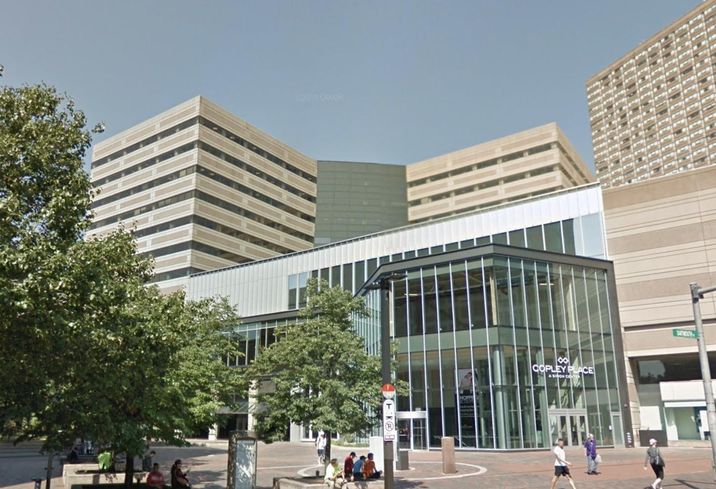
Boston is the third-fastest growing tech hub in the U.S., according to job listing site Indeed. But housing production hasn’t kept up with the surge of new workers flooding into Boston, pushing costs higher and higher. Boston is the second-most-expensive city to own a home, according to a January report by moving research firm Move.org.
The high cost of living could be weighing on employers determining who stays in the urban core and who could be employed in a cheaper environment.
“It’s getting tougher and tougher to keep those borderless sales jobs in downtown Boston,” Hunneman Director of Research Tucker White said.
Other major Boston companies have been moving select operations out of the city for years. Fidelity Investments announced in 2011 it was moving 1,100 jobs from its downtown headquarters to other parts of the country. Liberty Mutual maintains its corporate headquarters in Back Bay, but has also built a Plano, Texas, campus where the insurance provider is expected to eventually employ 4,000.
Tech companies could be looking to do the same, especially with artificial intelligence expected to impact as much as 25% of all U.S. jobs, including many tech jobs.
“Wayfair is committed to Boston and that’s allowed them to grow, but at the end of the day, they’re still paying a comparatively high real estate cost to other markets and can hire similar personnel elsewhere,” White said.

There may have been a string of early 2020 tech layoffs in Boston, but there have also been some industry wins.
Boston-based restaurant tech firm Toast is now valued at $4.9B after a $400M round of fundraising. Its revenue increased 109% in 2019 due to thousands of new restaurants using its payment hardware, Toast announced last month.
Following its planned merger with sportsbook technology provider SBTech, DraftKings is expected to be valued at $3.3B. The fantasy sports company is headquartered in Back Bay and has the leading U.S. market share for sports betting, according to Morgan Stanley.
Amazon continues to expand its tech reach across Greater Boston, with new offices planned for Medford and the Seaport.
There are 23,764 open tech jobs across Massachusetts — with more than 9,000 in Boston alone, according to Burning Glass Labor Insight data. That is more than 1,000 more open positions than there were at the end of 2019.
The collective, ongoing growth is enough to offset the layoffs, according to one of the state’s leading tech voices.
“When you look at each of the examples [of layoffs], there are real business reasons for it and [it] doesn’t reflect a larger trend in the economy,” said Pat Larkin, director of the Massachusetts Technology Collaborative Innovation Institute. “We don’t view what happened as a trend.”
Professional, scientific, technical services and information tenants, which encompass the TAMI sectors, have the largest office footprint in Boston, with a little more than 34% of the overall office sector, according to Newmark Knight Frank. TAMI tenants accounted for 40% of all office transactions in Boston’s central business district last year.
Despite the layoffs, strong demand coupled with job growth from burgeoning sectors like cybersecurity and digital health keep brokers and landlords cautiously optimistic in signing deals with tech tenants.
“Landlords don’t want a repeat of the bust era and are being mindful to sign tenants that can perform to the lease terms they have available,” Catlin said.
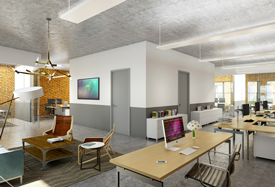
Credit: Bisnow
Newbury Street has been a passion of mine since the early ’80’s when I spent time doing deliveries for my late father’s art gallery. Thank you to: Bisnow, Aaron Twersky, David Gerzof Richard, AVALT, Asana Partners, Jamestown, Dartagnan Brown, UrbanMeritage, BIGfish Communications
The Newbury Street ‘super-sub’ market has continued to develop and flourish since that time into its current iteration, where “the spaces above the ground floor are now some of the most desirable workspaces in Boston. These 207 buildings in Back Bay form a submarket within a submarket, a working enclave totaling over 3M SF. Properties on Newbury Street are able to leverage a built-in cool factor that most office buildings and new developments can’t duplicate. Unlike other Boston submarkets with seasonal attractions, Newbury Street is a year-round destination — the neighborhood has a perpetual energy,” according the Bisnow.
“You never have to leave the street. Every possible food and beverage option, as well as every type of service, is just steps from your office front door,” Back Bay Association President Meg Mainzer-Cohen said. “Newbury Street is also a stone’s throw from a park system that is one of the best in the country, including Boston Public Garden and the Esplanade, making it easy to step out and recharge.”
You can read the full Bisnow article on its website, here.
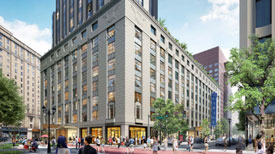
Credit: BBJ
Back Bay clearly is a destination for development in the City of Boston. If falls outside the FAA’s domain and doesn’t interfere with the “shadow effect”. One prime example is the Motor Mart Garage at 201 Stuart Street in Boston.
According to the BBJ, “the Motor Mart Garage redevelopment ‘would feature building a 310-foot residential tower atop the eight-story garage and converting 365 parking spaces into residential units…The 20-story tower would contain 222 apartments and condominiums, while the garage’s western portion would be converted into 84 residential units.'”
“The project’s height was considered as a continuation of the high spine of Boston,” the development team wrote in the Sept. 10 project notification form.
Additional details on the redevelopment are available on the Boston Business Journal, or you can view the detail page for further information Back Bay office space.
The city of Boston will no doubt entertain towers that exceed the 790-feet of 200 Clarendon Street, formerly known as the John Hancock Tower.
The location of Boston’s next tallest tower will most likely fall in the Back Bay neighborhood. This is due to the restriction imposed by the FAA from the Seaport and Financial District, as well as the shadow effect on Boston Common in the Mid-Town area.
According to the Boston Globe, “many Bostonians have come to love the relatively modest scale of the city’s neighborhoods. That affection surfaces every time someone proposes a building of substantial height. Invariably, issues like shadows and wind are raised.
‘Our neighborhoods, from the North End to the Back Bay to the South End, are full of people who love living in what appears to be a 19th-century community,” said Robert Brown, managing director at architecture firm Perkins+Will. “To them, tall buildings mean more density, more parking, more shadow.’”
Related Real Estate
• Back Bay Office Space for Lease
• Boston Financial District Real Estate
The old parking garage — once, apparently, the largest parking garage in the United States — is getting more than just a makeover. CIM Group, of Los Angeles, is proposing a 17-Story residential tower on top of the existing structure.
According to the BBJ, “CIM Group intends to build a 233,500-square-foot residential tower, with 280 apartment and condominium units, that would rise up to 278 feet to the “top of the highest occupiable floor,” the March 1 letter of intent states…The development would also involve redeveloping 205,000 square feet of the existing Motor Mart Garage “to integrate the structural core of the new tower” and create 106,000 square feet of residential and retail space.”
Additional information is available on the Bizjournals website.
Where do venture-backed companies focus when coming to the 617 area code? Unsurprisingly, the list focuses on the city core with areas like the Seaport, Financial District, Back Bay, Kendall Square and some clustered at the 90/95 interchange.
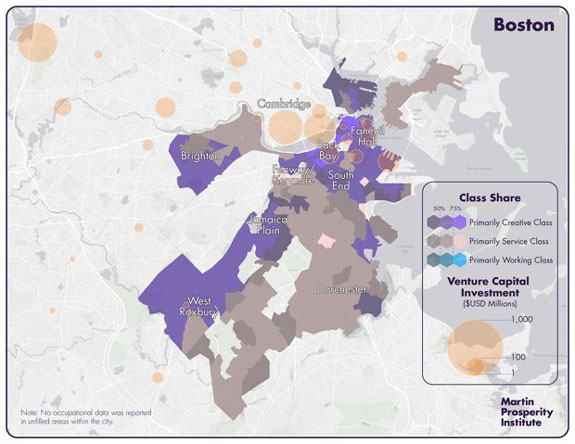
Credit: City Lab
Here’s a national perspective from City Lab:
While many large, high-tech companies like Facebook, Google, Apple, and Microsoft have their main campuses in suburban areas, cities and urban areas house the majority of venture capital–backed startups. My own research estimates that 55 percent of all venture capital investment now flows to urban neighborhoods. In the Bay Area and Boston–Cambridge, more than 60 percent of venture capital investment gravitates to these neighborhoods.
Additional information is available on CityLab’s website.
Your office rents in Boston are directly impacted by the distance to the nearest MBTA stop. Simply put, expect to pay more the closer you are.
Banker and Tradesman notes, “despite the departure of several large office tenants for the Financial District and Seaport, Back Bay still has Boston’s highest-priced office space. Buildings within a 5-minute walk of Hynes Convention Center station on the Green Line average $66.69 per square foot, partly reflecting the completion of Boston Properties’ 888 Boylston tower anchored by Natixis Global Asset Management.
You can read additional analysis on the impact of the MBTA on Boston office prices on B&T.
